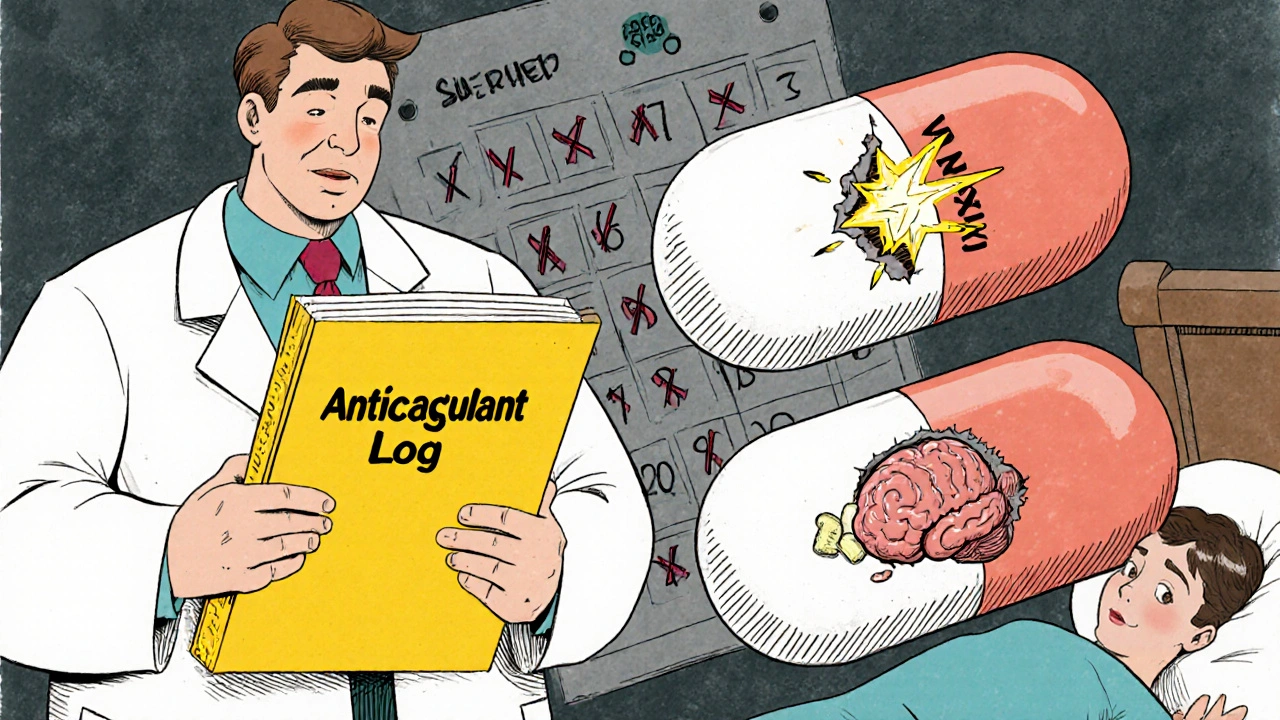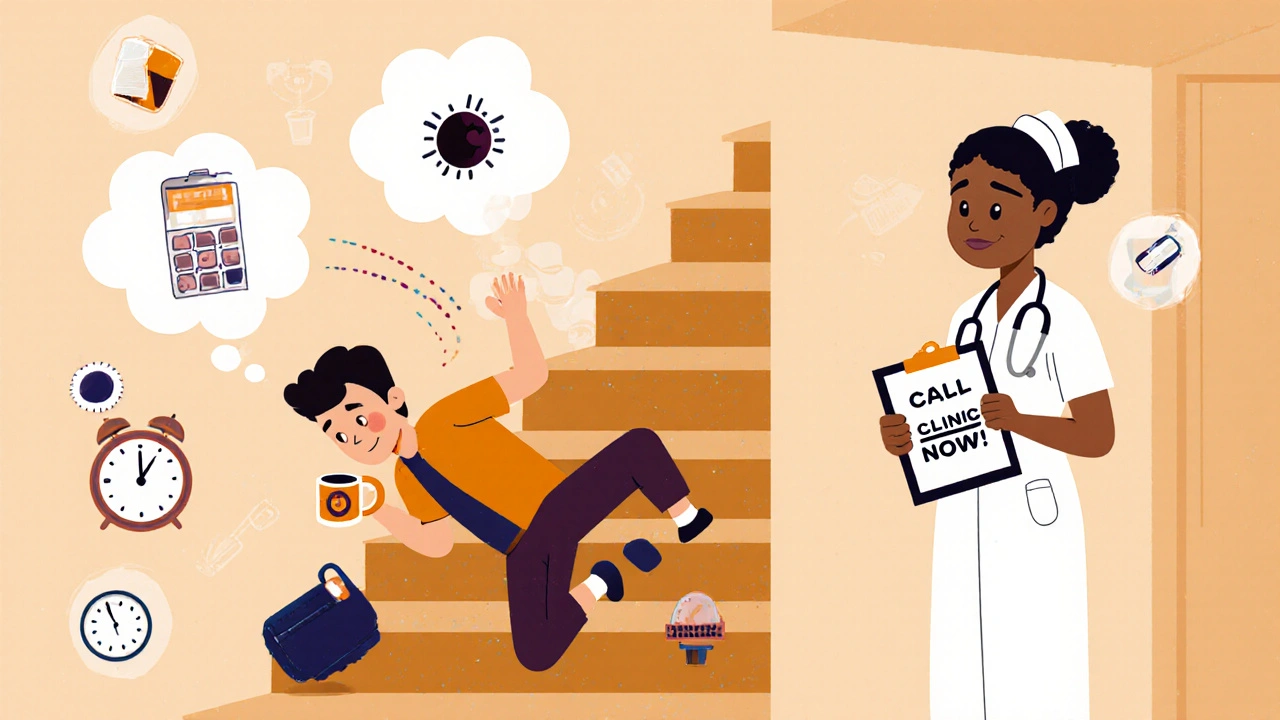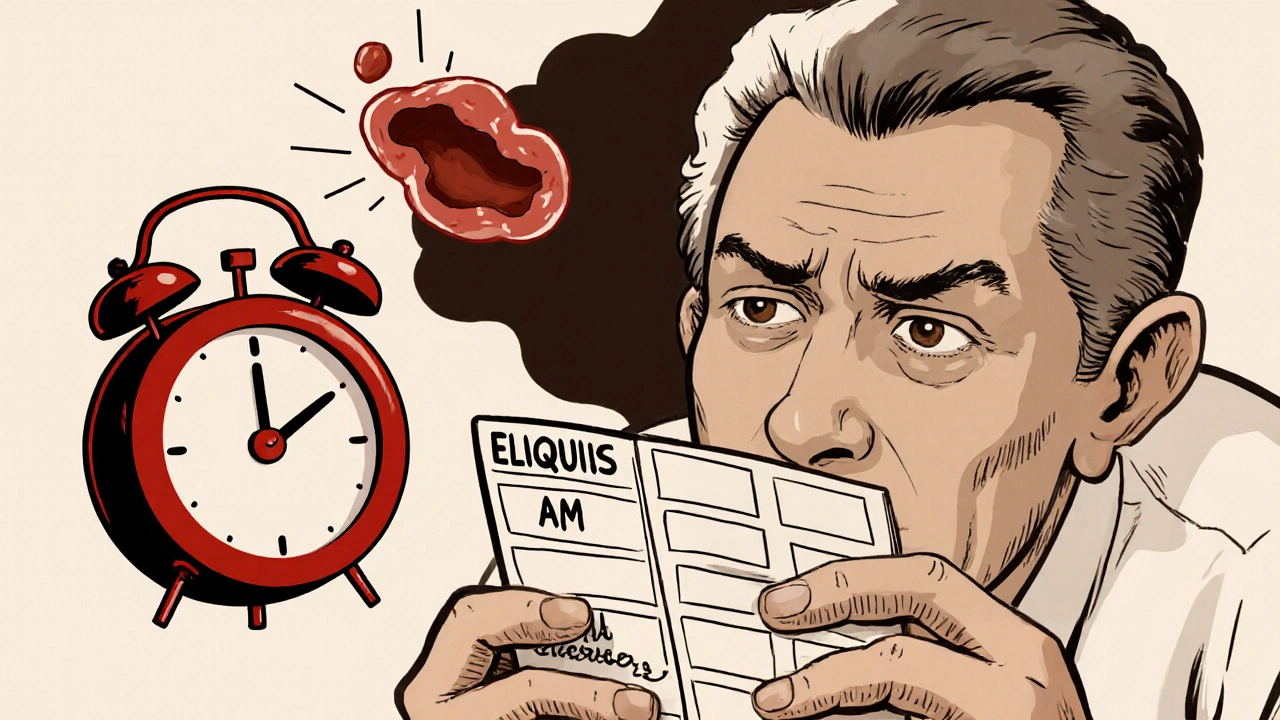Blood Thinner Missed Dose Assistant
Get guidance on what to do if you miss a blood thinner dose
Select your medication type and time elapsed to receive specific instructions based on medical guidelines.
Missing a dose of your blood thinner might seem like a small mistake-maybe you were busy, forgot because of a change in routine, or just didn’t notice until hours later. But for someone taking anticoagulants, even one missed pill can be dangerous. Blood thinners aren’t optional supplements. They’re life-saving medications that keep dangerous clots from forming in your veins and arteries. If you skip a dose, your body starts to lose that protective shield. And if you don’t know what to do next, the risk of stroke, pulmonary embolism, or serious bleeding goes up fast.
Why Blood Thinners Are So Precise
Blood thinners don’t actually make your blood thinner. They slow down the clotting process so clots don’t form where they shouldn’t-like in your heart, lungs, or brain. You might be on one of several types:- Warfarin (Coumadin, Jantoven): Requires regular blood tests (INR) to check if your dose is right. Most people need an INR between 2.0 and 3.0.
- DOACs (like Eliquis, Xarelto, Pradaxa): Newer drugs that don’t need blood tests but must be taken at the exact same time every day.
- Aspirin: A mild antiplatelet, sometimes used for heart protection, but not as strong as the others.
Each of these works differently. Warfarin has a long half-life-up to 60 hours-so missing one dose doesn’t immediately wipe out protection. But DOACs like apixaban (Eliquis) last only 8-15 hours. Skip a dose, and your clotting risk starts rising within hours. A 2021 study in Circulation: Cardiovascular Quality and Outcomes found that people on DOACs who missed more than 20% of their doses had a 57% higher chance of stroke. That’s not a small risk. It’s a major one.
What Happens When You Miss a Dose
The danger isn’t always immediate. But over time, missing doses builds up. For people with atrial fibrillation, not taking blood thinners regularly can raise stroke risk from less than 1% per year to over 6% per year. That’s a six-fold increase.Missing a dose doesn’t mean you’ll have a stroke tomorrow. But it means your body is no longer fully protected. Blood clots can form silently. They might travel to your lungs (causing a pulmonary embolism), your brain (causing a stroke), or your legs (causing deep vein thrombosis). And if you’re on warfarin, your INR drops below target, making clots more likely. If you’re on Eliquis, the drug simply isn’t in your system anymore.
Some people think, “I felt fine yesterday, so skipping today won’t matter.” That’s a dangerous assumption. You don’t feel clots forming. You don’t feel your INR dropping. That’s why consistency isn’t just advice-it’s medical necessity.
What to Do If You Miss a Dose
Never double up. That’s the golden rule. Taking two doses at once increases your bleeding risk dramatically. You could end up in the ER with internal bleeding, not because you missed a dose-but because you tried to fix it the wrong way.Here’s what to do based on your medication:
If you take warfarin:
- If you remember within 12 hours of your usual time, take the missed dose.
- If it’s been more than 12 hours, skip it. Don’t take it the next day. Just take your regular dose at your normal time.
- If you miss a dose and it’s already past midnight, don’t take it at all. Wait until tomorrow.
Write it down in your yellow book (your anticoagulant record). Tell your clinic at your next appointment. If you miss more than one dose in a row, call them right away.
If you take Eliquis (apixaban), Xarelto (rivaroxaban), or Pradaxa (dabigatran):
- If you remember within 6 hours of your missed dose, take it right away.
- If it’s been more than 6 hours, skip the missed dose.
- Do not take two doses at once.
- Take your next dose at your regular time.
For example: You usually take Eliquis at 8 a.m. and 8 p.m. You forget the morning dose and remember at 11 a.m. That’s within 6 hours-take it. But if you remember at 3 p.m., skip it. Take your evening dose at 8 p.m. as planned.
These time limits exist because DOACs are cleared from your body quickly. Waiting too long to take a missed dose doesn’t help-it just messes up your schedule and increases your risk.

When to Call Your Doctor or Go to the ER
Not every missed dose needs an emergency visit. But some symptoms mean you’re already in trouble. Call your doctor or go to the ER if you have:- Unexplained or large bruises, especially if they keep growing
- Red, pink, or brown urine (sign of internal bleeding)
- Black, tarry, or bloody stools
- Sudden dizziness, weakness, or confusion
- Severe headache or vision changes (could mean bleeding in the brain)
- Shortness of breath or chest pain (possible pulmonary embolism)
- You fell hard, hit your head, or had a major injury
Even if you didn’t miss a dose, trauma can be dangerous on blood thinners. A minor bump on the head can lead to bleeding inside the skull. A fall on your hip can cause internal bleeding you don’t feel until it’s too late. If you’re on Eliquis or warfarin and you’ve had a fall or accident, call your doctor-even if you feel okay.
Also, if you miss more than one dose in a row, don’t wait. Contact your anticoagulation clinic or prescribing provider. They might want to check your INR or adjust your plan.
How to Avoid Missing Doses in the First Place
The best strategy is prevention. Here’s what actually works:- Use a pill organizer with compartments for morning and night. Fill it weekly.
- Set phone alarms for both doses. Label them: “Eliquis AM” and “Eliquis PM.”
- Link it to a habit-take your pill right after brushing your teeth or with your morning coffee.
- Refill early. Don’t wait until you’re out. Set a reminder to refill 3 days before you run out.
- Keep your yellow book or log handy. Write down every dose you take-and every one you miss.
- Ask for help. If you live alone or have memory issues, ask a family member to check in.
People who use pill organizers and alarms have up to 40% better adherence rates, according to data from the ORBIT-AF registry. It’s not magic. It’s structure.

What Not to Do
- Don’t stop taking your blood thinner just because you feel fine. You’re not “cured.” You’re protected. Stopping increases your stroke risk immediately.
- Don’t change your dose on your own. Even if you think you’re “too thin” or “too thick,” only your doctor can adjust this safely.
- Don’t assume all blood thinners work the same. Warfarin and Eliquis have different rules. Mixing them up can be deadly.
- Don’t wait to ask questions. If you’re unsure what to do after missing a dose, call your clinic. It’s better to be safe than sorry.
One patient I know missed two doses of Eliquis over a weekend. She didn’t feel sick, so she didn’t call. Two days later, she had a stroke. She survived-but lost speech and mobility on her right side. Her doctor said if she’d called after the first missed dose, they could have adjusted her treatment and likely prevented it.
Final Thought: This Isn’t About Being Perfect
You’re not expected to be flawless. Life happens. You travel. You get sick. You forget. That’s normal.What matters is what you do next. If you miss a dose, don’t panic. Don’t double up. Don’t ignore it. Use the right steps for your medication. Write it down. Call your doctor if you’re unsure. And build systems so it doesn’t happen again.
Blood thinners are one of the most important medications you’ll ever take. They don’t cure your condition-they prevent disaster. Treat them with the seriousness they deserve. Your life depends on it.
What should I do if I miss a dose of Eliquis?
If you miss a dose of Eliquis and remember within 6 hours of your usual time, take it right away. If it’s been more than 6 hours, skip the missed dose. Never take two doses at once. Take your next dose at your regular time. If you’re unsure, call your doctor.
Can I take two doses of warfarin to make up for a missed one?
No. Never double your warfarin dose. Doing so increases your risk of serious bleeding, including internal bleeding in your stomach, brain, or other organs. If you miss a dose, follow the 12-hour rule: take it if you remember within 12 hours, skip it if you don’t. Always record missed doses in your yellow book and tell your clinic at your next appointment.
How soon after missing a dose does my risk of a clot go up?
For DOACs like Eliquis or Xarelto, your protection drops within 6-12 hours after a missed dose. For warfarin, it takes longer-up to 24-48 hours-because it stays in your system longer. But even with warfarin, missing doses regularly raises your stroke risk over time. The longer you go without your medication, the higher your risk becomes.
Do I need to get my blood tested if I miss a dose of a DOAC?
No, DOACs like Eliquis, Xarelto, and Pradaxa don’t require routine blood tests. Unlike warfarin, they don’t need INR monitoring. But if you miss multiple doses or have symptoms like unusual bruising or bleeding, your doctor may order a blood test to check your clotting status or kidney function-especially if you’re older or have other health issues.
What are the signs I’m bleeding internally from my blood thinner?
Signs of internal bleeding include: red or brown urine, black or tarry stools, unexplained large bruises, dizziness or fainting, severe headaches, vomiting blood, or sudden weakness on one side of your body. If you have any of these, call 911 or go to the ER immediately. Don’t wait. Internal bleeding can be fatal if not treated quickly.
Can I drink alcohol while taking blood thinners?
Moderate alcohol use (one drink per day for women, two for men) is usually okay-but it can increase bleeding risk, especially with warfarin. Heavy drinking can make warfarin less predictable and raise your INR dangerously. For DOACs, alcohol doesn’t interact as strongly, but it still increases bleeding risk. Always talk to your doctor about your alcohol habits-they may advise you to cut back.
Should I stop my blood thinner before surgery or dental work?
Never stop your blood thinner on your own. For minor dental work, you usually don’t need to stop. For surgery, your doctor will decide whether to pause it, reduce the dose, or switch to a different medication temporarily. Always tell your surgeon and dentist you’re on a blood thinner. They’ll coordinate with your prescribing provider to keep you safe.







shawn monroe
Missing a DOAC dose is like unplugging your smoke detector-yeah, you might not see flames right away, but you’re just one spark away from disaster. Eliquis has an 8-12hr half-life, so if you miss it, your anti-Xa activity plummets. That’s not ‘oops’-that’s a thrombotic window opening. I’ve seen patients code because they thought ‘I felt fine’ meant ‘I’m safe.’ You don’t feel clots forming. You don’t feel INR dropping. You just wake up with a stroke. Don’t be that guy. Set alarms. Use a pillbox. If you miss one, check the 6-hour rule. No double-dosing. Ever. 🚨
Savakrit Singh
It is imperative to underscore that non-adherence to anticoagulant regimens constitutes a critical public health concern, particularly in resource-constrained settings where monitoring infrastructure is lacking. The pharmacokinetic variability of DOACs, especially in patients with renal insufficiency or those concurrently using P-glycoprotein inhibitors, necessitates stringent adherence protocols. Empirical evidence from the ORBIT-AF registry corroborates that structured behavioral interventions, such as digital reminders and pill organizers, yield statistically significant improvements in medication compliance (p < 0.001). It is therefore recommended that healthcare systems institutionalize adherence tracking as a core component of anticoagulation management. 📊
Cecily Bogsprocket
I get it. Life gets messy. You’re tired. You’re traveling. Your kid’s sick. You forget. I’ve been there. I missed my warfarin for two days last winter because my phone died and I didn’t have my yellow book. I panicked. I didn’t call my clinic right away. I felt guilty. But here’s the thing-you don’t have to be perfect. You just have to be honest. Write it down. Call. Even if it’s late. Even if you’re embarrassed. Your provider has seen it all. They won’t judge you. They’ll help you fix it. And if you’re struggling? Ask for help. Get someone to check in. Set three alarms. Buy a pill box with a lock. Do whatever it takes. This isn’t about discipline. It’s about survival. You’re not weak for forgetting. You’re human. And humans need systems, not just willpower. 💛
Leo Adi
In India, many people still use warfarin because DOACs are expensive. I’ve seen grandmas take their pills with chai, forget for days, then panic and double up. No one tells them the 12-hour rule. No one gives them a pill organizer. The system fails them. I work at a rural clinic-we hand out color-coded ziplock bags with ‘AM’ and ‘PM’ written in Hindi. Simple. Works better than any app. Also, families help. If you live with someone, they remind you. That’s culture. That’s care. Tech helps, but human connection saves lives. 🙏
Melania Rubio Moreno
why do u even need these drugs?? like why not just eat more leafy greens and chill?? i skipped mine for a week and nothing happened?? maybe its all hype??
Gaurav Sharma
Are you aware that your comment demonstrates profound ignorance regarding anticoagulant pharmacology? Your casual dismissal of life-saving medication is not only irresponsible-it is potentially lethal. You are not a medical authority. You are a risk to yourself and others. Please consult a professional before endangering your life further. 🚫
Shubham Semwal
lmao u think leafy greens fix afib? bro u on warfarin and eating kale? ur INR’s gonna go haywire. u think ur body’s a video game where u can just respawn after a stroke? u got 6 months max if u keep this up. i’ve seen it. people die quiet. no drama. just gone. u wanna live? take the pill. period.
Sam HardcastleJIV
One cannot help but observe the inherent paradox in modern medical adherence: the more sophisticated the pharmacology, the more fragile the human compliance. The reliance on digital reminders and pill organizers suggests a systemic failure of personal responsibility. Perhaps the real issue lies not in the medication, but in the erosion of discipline in contemporary society. One wonders whether the medical establishment, by outsourcing accountability to apps and organizers, has inadvertently infantilized the patient. The solution, perhaps, is not more tools-but more moral fortitude.
archana das
Take your pill. It’s not about being perfect. It’s about showing up for yourself. Even if you’re tired. Even if you’re scared. Even if you think no one notices. Someone does. You. And your future self. One pill today means you’re still here tomorrow. That’s enough. 💪